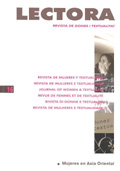Fragmented Encounters, Social Slippages: Lin Huiyin's "In Ninety-Nine Degree Heat"
Paraules clau:
1930s China, Chinese literature, modernism, Lin Huiyin, liuxuesheng, discourses of representation, otherness, social classResum
The article reads Lin Huiyin’s short story “In Ninety-Nine Degree Heat” (1934) in relation to the context of 1930s China, as an innovative literary work which combines elements from both the Chinese and the Western traditions, and as a text which informs readers not only of the problematic of class and gender issues in 1930s Chinese society but also of the context of the liuxuesheng who returns to China –like Lin Huiyin herself. Focusing on questions like otherness, representation, and encounters, the essay analyzes how the episodic narrative structure of Lin’s short story echoes social and representational discourses in post-May Fourth China, at the same time that it explores issues such as social inequality, otherness and alienation, which were crucial to the liuxuesheng, and which reflect Lin’s own experience as a returned and alienated liuxuesheng at the time.Descàrregues
Publicades
Com citar
Número
Secció
Llicència
Els autors i les autores conserven els drets d’autoria i atorguen a Lectora: revista de dones i textualitat el dret de difusió. L'’obra serà disponible simultàniament sota una Llicència de Reconeixement-NoComercial- SenseObraDerivada de Creative Commons que, si no si indica el contari, permet compartir l’obra amb tercers, sempre que aquests en reconeguin l’autoria i la publicació inicial en aquesta revista.
Els autors i autores són lliures de fer acords contractuals addicionals independents per a la distribució no exclusiva de la versió de l’obra publicada a la revista (com ara la publicació en un repositori institucional o en un llibre), sempre que se’n reconegui la publicació inicial en aquesta revista.
S’encoratja els autors i autores a reproduir la seva obra en línia (en repositoris institucionals, temàtics o a la seva pàgina web, per exemple), amb l’objectiu d’aconseguir intercanvis productius i fer que l’obra obtingui més citacions (vegeu The Effect of Open Access, en anglès).




